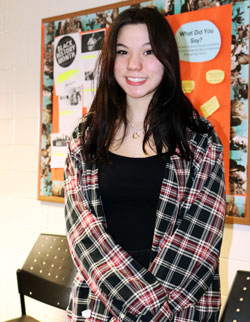Byron Center, Kelloggsville — Crackity, snappity, poppity, pop! There was some scatting going on, Louis Armstrong-style, in teacher Melody Welton’s Countryside Elementary School kindergarten class.
“He was singing scat!” shouted one kindergartner.
“He was playing a trumpet!” added another.
“Doobie-oobie dooo-boo!” said an animated Welton, as she read the children’s book, “When Louis Armstrong Taught Me Scat” by Muriel Harris Weinstein.
The class then talked about scatting, the art of vocal improvisation with wordless sounds, nonsense syllables or without words at all. Legendary jazz musician Armstrong is known as the inventor of scat.
“Why are we learning about Louis?” Welton asked the class, as students played invisible trumpets, moving their fingers to the beat of the song “When the Saints Go Marching In.”
“Because he’s so great!” Jonathan Damsgaard piped up.
Welton and fellow kindergarten teachers Michelle Clevenger, Jessica Abel and Elaina Aguilar-Broome are collaborating during Black History Month to introduce their students to Black historical figures. Students are learning about such legends as Aretha Franklin, Jackie Robinson, Rosa Parks, Martin Luther King, Jr., and Nelson Mandela through lively book read-alouds and literature.
“We as a team each have a historic person to focus on for the week,” Clevenger said. “Each day we share how they played a crucial role in history and share read-alouds with our class highlighting their importance. Each week we switch people to help our kids learn about multiple important people of color who were courageous, brave, and broke down barriers to make our world better today.”
Along with the read-alouds, the teachers are filling their bookshelves with books by Black authors and featuring Black characters. Classrooms throughout the kindergarten-through-fourth-grade school also created collage posters of influential Black people.

Acknowledging Great Leaders
Students are also learning about Black leaders at Kelloggsville Public School’s 54th Street Academy. Director Bilal Muhammad said the school does Black History Month activities as a way to recognize Black excellence.
“It’s important that we acknowledge the great leaders that came before us as well as the current innovators that continue to pave the way for African Americans,” he said.
And he added that Black History Month can’t simply be a box that gets checked off once a year and then ignored for the other 11 months.
“This year we’ve done more in-depth activities for Black History Month,” he said. “Our goal is to create lessons, projects and creative opportunities that we can build on each year.”
February has thus far seen lessons in U.S. history tied to the poetry of Amanda Gorman, who mesmerized a national audience with her Inauguration Day poem, and the movie “Hidden Figures”; hallways decked out with the Root 100 Most Influential African Americans of 2020; and T-shirts made for in-person students of Black trailblazers who fought hard for equal rights and opened the doors for future African-American pioneers.
Students said they have appreciated the ways in which the school has brought Black history to life.

Zoey Wedge said Black people “work hard every day dealing with hate and racism for no reason other than the color of their skin.” So the chance to step back and learn about Black leaders and feel a sense of pride about her history and heritage has been a welcome part of her junior year.
Muhammad said it was important to create programming that students would resonate with.
“We have a very diverse student population in our building and districtwide,” said Muhammad. “At 54th Street Academy about 40 percent of our students have a connection to Black History Month in terms of identifying themselves as Black.”
The month is also personal for Muhammad.
“Black History Month to me means a time to honor, remember and restore Black history,” he said. “As an African American administrator, it gives me the opportunity to share my experiences and knowledge and reflect on how far we’ve come and how far we’re going to go.”

Introducing Racial Topics Early
In Byron Center, educators also see the need to weave diversity into instruction year-round. Welton said she wants her students to have knowledge about the contributions of people of color throughout their education. Byron Center is a predominantly white district with less than 2 percent African American students, according to mischooldata.
She said she wants conversations to be comfortable, beginning as young as kindergarten.
“I’ve had the privilege to be able to teach in a lot of international schools before I came to Byron Center,” said Welton, who has studied in South Africa and lived in Australia and South Korea. “I always had a huge diversity among my students and it came up very organically in conversations, talking about differences … Coming back to West Michigan, I just find it important to give them exposure and start conversations.”
She also talks to them about the history of slavery and inequality in an age-appropriate way.
Fourth-grade teacher Jordan VanEngen, the district’s Diversity Committee representative for Countryside, is having students focus on Influential People of the Week, such as Madame C.J. Walker, an entrepreneur, philanthropist, and political and social activist. Students learn why the person has influence through stories, activities and other resources. She extends the focus beyond just Black History Month, “knowing that kids need to be celebrated with all their differences.”
“I’m super passionate about equity in the classroom in general,” VanEngen said. “I grew up in a very diverse district. Being a minority in my first classroom as a student really impacted me throughout my career.”
She also wants her students to be able to talk about subjects that can be uncomfortable.
“I love having hard conversations. Even as fourth-graders, these students have such important conversations. They want to talk.”
Fourth-grader Liam Wonders said he appreciates learning about influential Black leaders.
“There are more to come, and I respect people who have done so many great things for this world.”
Phil de Haan contributed to this story.









